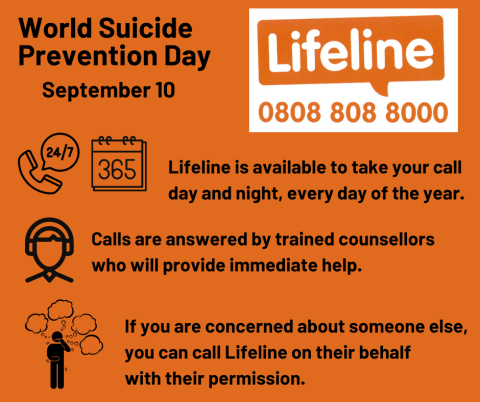World Suicide Prevention Day – Lifeline is here for those in crisis

Lifeline – regional crisis counselling helpline is available day and night, every day of the year.
As we approach World Suicide Prevention Day on Saturday 10 September, the Public Health Agency (PHA) is reminding people that Northern Ireland’s crisis counselling helpline, is available for everyone, 24 hours a day, 365 days of the year.
The trained counsellors at the Lifeline helpline support people experiencing thoughts of suicide, those with high levels of anxiety and those needing support with feelings of low mood and depression.
John Hand, Lifeline Service Manager, said: “We want people to know that help and support is out there and anyone in despair, or struggling in a crisis, does not have to go through it alone. Lifeline is here for them.
“Our counsellors are trained in wide range of issues, from relationship breakdown, abuse, self-harm, addiction-related issues, to name a few. They will listen, support, or signpost to appropriate community and voluntary organisations that can help. Lifeline can also offer short-term counselling if required and agree follow-up calls for a limited time to check in on people to see how they are coping. Healthcare workers including GPs also regularly refer people to Lifeline.
“Lifeline also accepts calls on behalf of someone in distress who can’t make that first call for themselves. For example, Lifeline counsellors can help a friend or family member to support the person in distress.
“Every life lost to suicide is a tragedy for the individual, their family and friends and the wider community. We all can play our part to help spot the signs and support people in distress.”
The theme for this year’s World Suicide Prevention Day is ‘Creating Hope Through Action’ and the PHA is also encouraging everyone to be aware of some of the signs that people close to them may be having difficulty coping, and to take action. Ask someone you know, if you think they may be struggling, ‘How Are You?’, perhaps tell them, ‘I’ve noticed you’ve not been yourself recently’ and listen to what they say. Remind them you are always there for them and Lifeline is always available.
When someone is having difficulty coping, often a change in behaviour is what you will notice first. Some things to look out for are:
- They may be more irritable than normal, with the smallest thing causing them to get annoyed with themselves or others around them;
- They may be spending more time alone and not want to go out and do the things they normally enjoy doing;
- They may complain of feeling tired and have disturbed sleep patterns;
- They may be skipping meals or eating more than normal;
- You may notice that they are misusing alcohol or drugs, or taking days off work, school or college.
Remember, we are all different and not everyone will display all of these early warning signs.
For more information visit www.LifelineHelpline.info
Call Lifeline on 0808 808 8000 or for people with hearing difficulties contact the Lifeline textphone service on 18801 0808 808 8000
For access to a wide range of mental health and emotional wellbeing resources go to www.MindingYourHead.info
- On average, Lifeline receives a call every 11 minutes
- There are over 45,000 calls to Lifeline per year
- 7 day waiting time to receive community counselling
Service user feedback:
- 87% would recommend Lifeline to a friend of family member;
- 92% said they received the help that mattered to them;
- 86% Lifeline helpline satisfaction;
- 90% Community counselling satisfaction;
- 74% showed a clinical or reliable improvement post-counselling.
